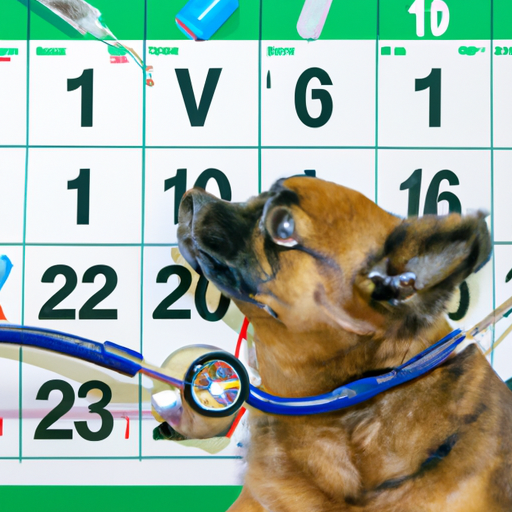As a dedicated caregiver to your furry friend, it’s important to understand the necessary preventative measures to keep them healthy. One such preventative measure is ensuring they receive their yearly vaccinations. Let’s dive into the detail about what yearly vaccines your dog needs.
1. Introduction to Dog Vaccines
Immunizations are crucial for your dog’s health. Just like humans, dogs are prone to certain diseases, and vaccines can help prevent these. In essence, vaccines are a small, safe dose of a disease that prepares your dog’s immune system to fight off the real thing.
There are two types of vaccines: core vaccines and non-core vaccines.
-
Core vaccines are those that every dog should receive regardless of lifestyle or location. They protect against more severe diseases that are widely spread in canines.
-
Non-core vaccines are optional vaccines that should be considered in light of the dog’s lifestyle and the geographical location where the disease is prevalent.
2. Core Vaccines: What They Are and Why They Are Essential
2.1 Rabies Vaccine
Rabies is a fatal disease that can affect dogs and humans alike. It’s a core vaccine and is legally required in many places. The first dose is usually given to puppies at 16 weeks of age and then every one to three years, depending on the law and type of vaccine in your area.
2.2 DHPP Vaccine
DHPP is an abbreviation for Distemper, Hepatitis, Parvovirus, and Parainfluenza. This combo vaccine protects against four diseases:
- Canine Distemper: Affects the respiratory, gastrointestinal, and nervous systems.
- Hepatitis: Infects the liver and can lead to serious health issues.
- Parvovirus: A highly contagious viral illness with severe gastrointestinal symptoms.
- Parainfluenza: Part of the ‘kennel cough’ complex and can lead to respiratory issues.
3. Non-Core Vaccines: When They Are Needed
Non-core vaccines are given depending on the risk of exposure. These include:
-
Bordetella Bronchiseptica: This bacteria is one of the causes of ‘kennel cough’. It’s often recommended for dogs who frequently visit dog parks, grooming salons, boarding kennels, and dog shows.
-
Lyme Disease: If your dog spends a lot of time outdoors, especially in areas with a high tick population, your vet may suggest this vaccine.
-
Leptospirosis: This disease can be contracted from rodent urine or contaminated water. If your dog spends a lot of time outdoors or in areas with high rodent populations, this vaccine may be beneficial.
-
Canine Influenza: Just like human flu, there are different strains of canine influenza. If your dog is in regular contact with other dogs, this vaccine may be recommended.
4. Vaccination Schedule: When to Get Vaccines
Vaccinations begin when your dog is just a puppy. Puppies receive a series of vaccines every 3-4 weeks until they are 16 weeks old. Adult dogs need booster shots annually or every three years, depending on the vaccine and your vet’s recommendation.
| Age | Vaccine |
|---|---|
| 6-8 weeks | DHPP (vaccines for distemper, adenovirus [hepatitis], parainfluenza, and parvovirus) |
| 10-12 weeks | DHPP, Leptospirosis, Bordetella |
| 12-16 weeks | Rabies, DHPP, Leptospirosis, Lyme |
| 1 year | DHPP, Rabies, Leptospirosis, Lyme |
Table: General Vaccination Schedule for Dogs
5. Frequently Asked Questions
Q: Can vaccines make my dog sick?
A: Some dogs might experience mild side effects like soreness at the injection site, mild fever, or decreased appetite and activity. Serious reactions are rare. If you notice anything unusual after your dog is vaccinated, contact your vet immediately.
Q: What if my dog misses a vaccine?
A: If your dog misses a vaccine, schedule a make-up appointment as soon as possible. It’s important to stick to the vaccination schedule to ensure your dog is protected.
Q: Are there risks associated with vaccines?
A: Vaccines, like all medical procedures, carry some risk. However, in most cases, the benefits far outweigh the risks. Your vet will be able to discuss this with you in more detail.
Q: Are there natural alternatives to vaccines?
A: While some pet owners prefer natural remedies, there is no scientific evidence to suggest that these can replace vaccines. Vaccines have been extensively tested and proven to protect against dangerous diseases.
Q: Do older dogs need vaccines?
A: Yes, older dogs need to be vaccinated. However, the frequency may change depending on their health status. Your vet will guide you on this.
Remember, every dog is unique and so are their healthcare needs. Always consult with your vet to determine the best vaccination schedule for your furry friend.



